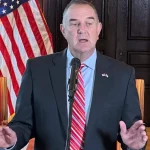Missouri has once again found itself at the center of political controversy, as the state’s governor announced a special legislative session on redistricting. This decision comes at a time when partisan divides are growing sharper, and the balance of political power in Missouri—and possibly in Washington, D.C.—hangs in the balance.
- Understanding Redistricting
- Why the Missouri Governor Called a Special Session
- Political Tensions Surrounding the Session
- The History of Redistricting Battles in Missouri
- National Implications of Missouri’s Redistricting
- Expert Opinions on the Special Session
- The Role of Public Opinion
- Possible Outcomes of the Special Session
- Impact on Missouri Communities
- Lessons from Other States
- FAQs
- Conclusion
Redistricting, often called the political chessboard of democracy, determines how congressional and state legislative districts are drawn. While it may sound like a technical or bureaucratic exercise, redistricting directly influences elections, representation, and policy outcomes. The governor’s move to call a special session is not just about drawing new maps; it is about the future of political power in Missouri.
This article takes a deep dive into why the special session was called, what’s at stake, the political tensions shaping the debate, and what it means for the people of Missouri and beyond.
Understanding Redistricting
Redistricting occurs every ten years, following the U.S. Census. The process is designed to reflect population shifts, ensuring equal representation. However, it has become a deeply political issue because the way lines are drawn can heavily influence election outcomes.
The Basics of Redistricting
- Each district must have roughly the same number of people.
- Lawmakers often use the process to strengthen their party’s chances, a practice known as gerrymandering.
- Redistricting impacts representation in Congress, state legislatures, and even local politics.
In Missouri, redistricting has long been contentious. Partisan control of the process often sparks disputes, lawsuits, and power struggles.
Why the Missouri Governor Called a Special Session
The governor announced the special session after lawmakers failed to agree on a redistricting map during the regular legislative calendar.
The Key Issues
- Republican Divisions: Missouri Republicans, who hold a supermajority in the legislature, could not unite on how aggressively to draw districts favoring their party.
- Democratic Concerns: Democrats argue that the proposed maps underrepresent urban communities and minorities, potentially weakening their political influence.
- National Stakes: Missouri’s districts could play a role in determining control of the U.S. House of Representatives.
By calling the special session, the governor aims to force lawmakers back to the table and push them toward a solution.
Political Tensions Surrounding the Session
The announcement has heightened political tensions across Missouri.
Republican Infighting
Despite their majority, Missouri Republicans are split between moderates and hardliners. Some favor a 7–1 map that would virtually eliminate Democratic representation, while others prefer a more balanced 6–2 split to avoid potential legal challenges.
Democratic Pushback
Democrats have accused Republicans of attempting to silence urban voters in St. Louis and Kansas City. They argue that the maps ignore population growth in diverse communities and weaken minority voices.
Public Frustration
Citizens’ groups and advocacy organizations have expressed concern that partisan fights are overshadowing the real purpose of redistricting: fair and equal representation for all Missourians.
The History of Redistricting Battles in Missouri
Missouri has a long and contentious history with redistricting.
Past Legal Challenges
- In 2011, lawsuits over district lines delayed implementation and created confusion.
- In 2018, Missouri voters approved the “Clean Missouri” amendment, which aimed to reduce gerrymandering by using a nonpartisan demographer. However, in 2020, Republicans successfully pushed to roll back parts of the amendment, restoring more control to lawmakers.
The Current Climate
Today, the fight is not just about lines on a map. It is about whether Missouri will lean further right, cementing Republican power for years, or whether there will remain spaces for competitive elections.
National Implications of Missouri’s Redistricting
Missouri may not be the largest state, but its redistricting fight has national consequences.
Impact on the U.S. House of Representatives
- Republicans are seeking to maximize their advantage as they aim to maintain or expand control of Congress.
- A 7–1 map would essentially wipe out Democratic influence at the congressional level from Missouri.
Message to Other States
What happens in Missouri could embolden other Republican-led states to pursue aggressive gerrymanders, or inspire Democrats in their states to push back harder.
Expert Opinions on the Special Session
Legal scholars, political scientists, and advocacy groups have weighed in on the governor’s decision.
Quotes from Experts
- A University of Missouri political science professor noted: “This is about more than Missouri. It’s about setting precedents that could reshape the political map nationwide.”
- Advocacy groups argue that “the governor’s call for a special session reflects a broken system where partisan advantage takes priority over fair representation.”
The Role of Public Opinion
While lawmakers battle in the Capitol, public opinion remains divided.
Poll Findings
- Surveys suggest that a majority of Missourians support fair maps drawn by independent bodies rather than politicians.
- However, partisanship plays a major role: Republicans tend to support stronger party-favorable maps, while Democrats call for nonpartisan processes.
Grassroots Pressure
Community groups, churches, and student organizations have organized rallies and town halls, demanding transparency and fairness in the redistricting process.
Possible Outcomes of the Special Session
The special session could lead to several different scenarios.
Scenario 1: Republicans Push Through a 7–1 Map
This would solidify GOP dominance but could invite lawsuits and accusations of extreme gerrymandering.
Scenario 2: Compromise on a 6–2 Map
A more balanced approach may reduce legal risk but could anger Republican hardliners who want maximum advantage.
Scenario 3: Court Intervention
If lawmakers cannot agree, courts may step in to draw the maps, as has happened in other states.
Impact on Missouri Communities
Beyond the political chessboard, real people will feel the effects of redistricting.
Urban vs. Rural Representation
- Urban centers like St. Louis and Kansas City risk losing influence.
- Rural areas may gain more political power, reflecting broader national trends.
Minority Representation
Civil rights groups warn that proposed maps could dilute minority voting strength, undermining decades of progress under the Voting Rights Act.
Lessons from Other States
Missouri is not alone in facing redistricting battles.
Recent Examples
- In Texas, new maps were criticized for underrepresenting Hispanic communities despite major population growth.
- In New York, Democratic lawmakers pushed aggressive maps favoring their party, sparking lawsuits.
These cases show that redistricting controversies are part of a nationwide struggle over democracy itself.
FAQs
What is redistricting?
Redistricting is the process of redrawing political boundaries to reflect population changes, typically done every ten years after the Census.
Why did the Missouri governor call a special session?
The governor called the session because lawmakers failed to agree on new maps during the regular legislative calendar.
What are the main political tensions in Missouri’s redistricting?
The tensions revolve around Republican divisions, Democratic concerns over fairness, and national implications for control of Congress.
How could this impact Missouri communities?
It could reduce the influence of urban and minority communities while boosting rural representation.
What happens if lawmakers fail to agree on new maps?
Courts may intervene and draw the maps themselves, which has happened in past redistricting disputes.
Conclusion
The Missouri governor’s decision to call a special session on redistricting underscores the high stakes of the process. While it may appear technical, redistricting shapes the political future of the state and influences national power struggles.
At its core, the debate is about more than just lines on a map—it is about democracy, fairness, and whose voices get heard in government. The coming weeks will reveal whether lawmakers can strike a balance or whether the courts, once again, will step in.
What is clear, however, is that Missouri’s redistricting battle is not just about Missouri. It is part of a larger struggle playing out across America, where the principles of representation and power are constantly being tested.










